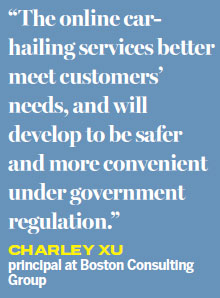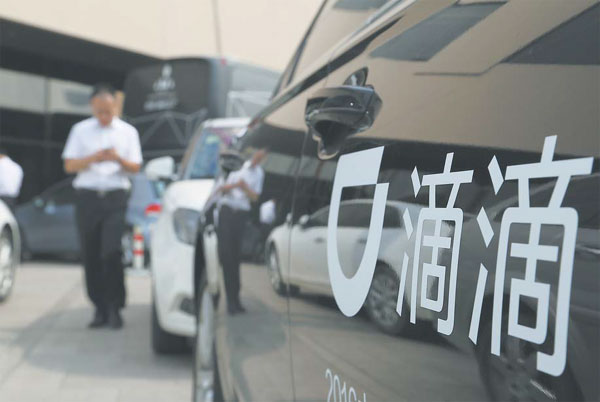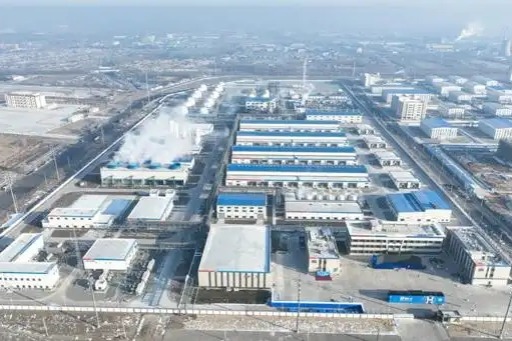Auto traders brace for impact from ride apps

Ride-hailing services have been granted legal status in China at the same time that major cities are limiting car numbers. The net effect could limit new auto sales.
This month, the State Council released a regulation legalizing the ride-hailing apps. The regulation, which takes effect on Nov 1, is part of efforts to standardize the business.
Analysts say this will likely have a knock-on effect in terms of demand for new vehicles.
| A pedestrian passes by a chauffeured car of Didi Chuxing, the dominant ride-hailing service provider in China. Wu Chang Qing / For China Daily |
"The online car-hailing services better meet customers' needs, and will develop to be safer and more convenient under government regulation," says Charley Xu, a principal at Boston Consulting Group. Meanwhile, he adds, "car ownership is being discouraged through restrictions on purchases and usage".
The company has forecast China's auto market to shrink 2 percent a year over the next decade, based on a 5 percent decline in individual purchases of private vehicles and a car-hailing fleet replacement rate of 3 percent.
Data from the China Association of Automobile Manufacturers show total car sales nationwide were 24.6 million last year, making it the world's largest market.
According to Nielson Co Greater China, as ride-hailing and ride-sharing apps save people money and hassle - no purchase fee, tax, insurance or fuel costs, and no need to enter a city's license plate lottery or auction - they have the potential to deter potential car buyers.
Xiong Guangan, a father of two in Beijing, says he and his wife turned down the opportunity to own a second car. "I commute to work in a chauffeur-driven car on weekdays, usually Uber. We now use our car only for family outings to the suburbs."

Nielson released a report in February based on a poll of residents that found 67 percent who do not already own a car feel there is no need to get one. Of those who do have a car, 32 percent said they would not buy a second, while almost 10 percent were thinking about selling their car.
Xu at Boston Consulting Group says he expects individual demand in China to decline 5 percentage points a year, as the younger generation in large cities have less interest in owning a vehicle, partially due to the availability of ride-hailing services.
"The aim of local governments is to control the number of vehicles on the roads," he says. "Even if congestion charges are introduced instead of restrictions on car purchases and usage, the result will be similar."
The new regulation on ride-hailing will encourage more drivers to sign up with such services, which will see fleets grow and mean service users will have more options, he adds.
Liu Xiaoming, vice-minister of transportation, says he expects the State Council regulation to boost the ride-hailing sector in the long term, as it will support the development of ride-hailing platforms and encourage cars owners to provide ride-sharing services, which will ease congestion in cities and reduce air pollution.
However, the news is not all bad for auto traders. Shi Jianhua, deputy secretary-general of the China Association of Automobile Manufacturers, says a boost for ride-hailing services may lead to "a larger demand for car replacements".
The new rules require that vehicles registered for ride-hailing are retired after 8 years, to maintain service levels.
"It's also possible there will be greater demand for vehicles tailored to better satisfy the specific needs of drivers and customers," Shi adds, citing the example that many passengers will expect to be able to access Wi-Fi.
Xu agrees that service providers will likely buy more vehicles and has forecast that the car fleet demand will add 3 percentage points in annual growth to China's new car purchase volume.
Boston Consulting Group also expects many customers, especially those in second-tier cities and smaller townships and counties, will still choose to buy cars at the same rate as residents in larger cities, as most still see vehicles as a status symbol.
haoyan@chinadaily.com.cn
(China Daily Africa Weekly 08/12/2016 page28)
Today's Top News
- Experts: Lai not freedom fighter, but a pawn of the West
- Hainan evolves as gateway to global markets
- Opening up a new bridge between China and world
- Tour gives China-Arab strategic trust a boost
- China accelerates push for autonomous driving
- Opening of new gateway can help foster global economic and trade cooperation































